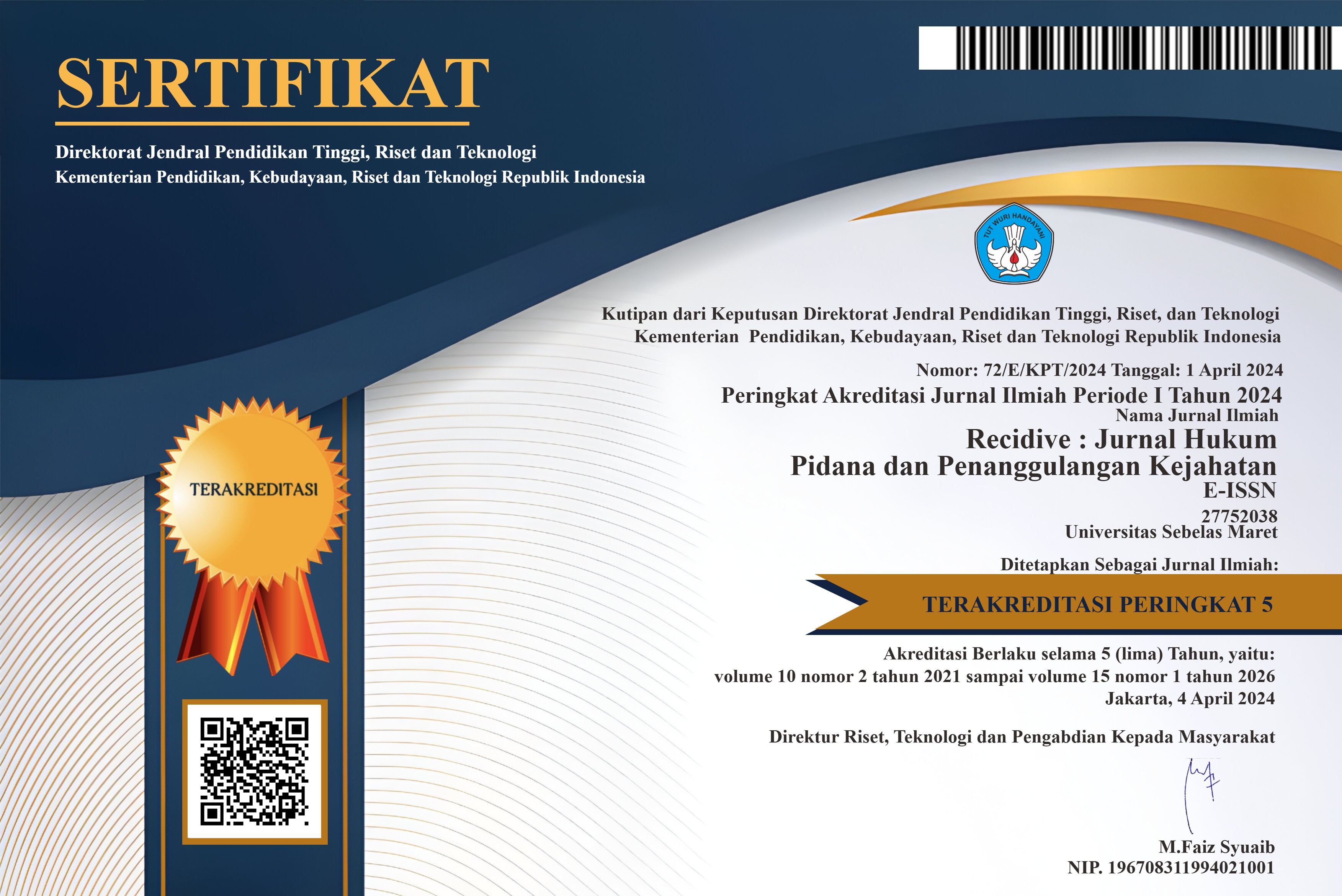Focus and Scope
This Journal aims primarily to facilitate undergraduate students paper over current developments on criminal law issues in Indonesia as well as to publish innovative legal construction of the money laudering law, corruption law,criminology, and financial crimes. It provides immediate open access to its content on the principle that making research freely available to public support a greater global exchange of knowledge.
Section Policies
RECIDIVE
Peer Review Process
- Recidive Employs a double-blind peer-review method, namely that both reviewer's and author's (s) identities will be concealed from each other.
- Initial Screening. All submitted manuscripts will be screened by the Editor-in-Chief to determine whether the manuscript abides by the focus and scope of Recidive. Manuscripts that do not meet the basic requirements will be rejected without further review.
- If the manuscript meets these two criteria, it is checked for plagiarism or duplicate publication with a Similarity Check. After confirming its result, it is dispatched to two investigators in the field with relevant knowledge.
- Peer-review. All manuscripts that pass the initial screening stage, will be distributed to two experts in the relevant field to undergo a double-blind peer-review.
- First Decision. A decision on a peer-reviewed manuscript will be given once both reviewers have submitted their review reports. In the event that both reviewers have differing opinions about the manuscript, the final decision will be handed over to the Editor-in-Chief. At this stage, the author(s) will receive at least one of these decisions: accepted; revision required; or rejected.
- Revision Stage. Manuscripts that have been recommended for revision will be returned to the submitting author. Author(s) will have up to 1 month to revise the manuscripts. The revision process will be limited to a maximum of two rounds.
- Final Decision. If the author(s) fail to meet the revision requirements after the second round, the manuscript will be rejected. All accepted manuscripts will go through the final editing and layout process.
Open Access Policy
This journal provides immediate open access to its content on the principle that making research freely available to the public supports a greater global exchange of knowledge.
Archiving
This journal utilizes the LOCKSS system to create a distributed archiving system among participating libraries and permits those libraries to create permanent archives of the journal for purposes of preservation and restoration. More...
Publication Ethics
The Recidive Journal is a peer reviewed journal published by the Faculty of Law, Sebelas Maret University. This statement describes the ethical behavior of all parties involved in the act of publishing articles in this journal, including authors, editor-in-chief, and the Editorial Board. , peer reviewers and publishers. This statement is based on COPE's Guidelines for Best Practice for Journal Editors.
Author:
1.Authors must ensure that they have written original works.
2.The author must ensure that the manuscript has not been published elsewhere.
3.Authors are responsible for editing the language before submitting articles.
4.Authors who submit their work to a journal for publication because the original article confirms that the submitted work represents the author's contributions and has not been copied or plagiarized in whole or in part from another work without explicit citing.
5.Authors must notify Recidive Journal of any conflicts of interest.
6.Authors must report any errors they find in their manuscripts to the Recidive Journal.
7.Any works or words from other authors, contributors, or sources must be credited and referenced as appropriate.
8.An author agrees to a license agreement before submitting articles.
9.All articles must be submitted using an online submission procedure.
Editorial Board:
1. The Editorial Board must ensure fair peer-review of articles submitted for publication.
2. The Editorial Board must disclose any conflicts of interest.
3. Editorial Board must ensure that all information related to submitted manuscripts is kept confidential before publication.
4 .Editorial Boards must evaluate manuscripts only for their intellectual content.
5. The Chief Editor will coordinate the work of the editors.
Reviewers:
1.The reviewer evaluated the manuscript based on content regardless of the author's ethnic origin, gender, sexual orientation, nationality, religious beliefs, or political philosophy.
2.Reviewers must ensure that all information related to submitted manuscripts is kept confidential and must report to the Editor in Chief if they become aware of copyright infringement and plagiarism on the part of the author.
3.Reviewers must evaluate the submitted work objectively and clearly present their opinion on the work in a clear manner on the review form.
4.Reviewers must keep information relating to the manuscript secret.
5.Reviewers who feel ineligible to review the research reported in the manuscript or find that a quick review is not possible should notify the Editor in Chief and excuse himself from the review process.




.jpg)





